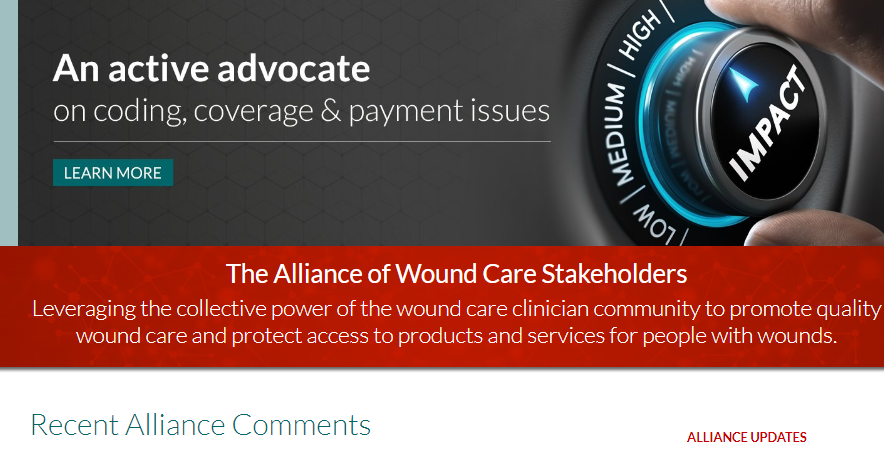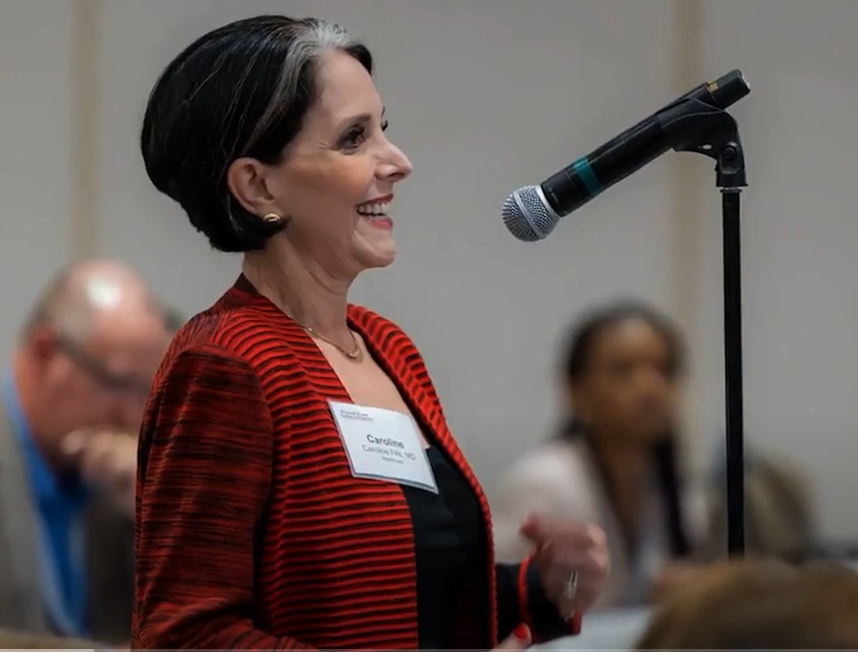At the recent SAWC, we celebrated the 20th anniversary of the Alliance of Wound Care Stakeholders. I’ve had the incredible privilege of co-chairing the Alliance just about since its inception. This video takes a walk down memory lane about all those visits to the Centers for Medicare and Medicaid (CMS) in Baltimore in all kinds of weather – not to mention meetings with the FDA, regional Medicare contractors, Medicare advisory meetings, and the list goes on.
Policy making is messy but at least with CMS, it’s (mostly) public and we get the chance to comment on proposed changes. I have testified at a lot of CMS meetings (in the days before COVID!). The rise of Medicare Advantage (MA), administered by private payers, means that a lot of coverage policy now lives in the “black box” of a private payer. We talked about our huge frustrations with that issue at the Alliance Meeting when we met with Nishamarie Sherry Mills, JD, MPH, Director of the Division of Appeals Policy for the CMS Medicare Enrollment and Appeals Group. Ms. Mills certainly got an earful from practitioners who were not able to get products and services approved for MA patients that would have been covered if the patient had traditional Medicare.
You know that scene from the movie Men in Black, in which Kay says, “There’s always an Arquillian Battle Cruiser, or a Corillian Death Ray, or an intergalactic plague that is about to wipe out all life on this miserable little planet, and the only way these people can get on with their happy lives is that they DO NOT KNOW ABOUT IT!”? Well, when it comes to public policy, the only way that wound care patients and practitioners can get on with their happy lives is if they DO know about it!
A major goal of the Alliance is to make sure that practitioners, manufacturers and patients are always informed about the powerful forces that could align to wipe out access to products and services for patients with wounds. The pace at which we have to work just to keep up with those policies is nothing sort of staggering. You can get a taste of it by checking out the “Recent Alliance Comments” on the Alliance Website. Remember that in order to write these comments, thousands of pages of documents have to be carefully read and then analyzed as to their possible impact. Crafting comments about proposed policies requires the collaboration of a lot of people, and the time frame is often incredibly short. It’s simply impossible for any one person or even any one clinical association to do the job. We have to work together! This is tedious work and it’s not sexy. It can be hard to convey why it matters, until one day as a clinician, you wake up and find that there’s a service you can’t offer to patients anymore. When you wonder exactly how that huge change in coverage happened, the answer will be that 6 months earlier, there were a few “minor” changes in the wording on page 36 of a 90 page draft policy, but no one noticed because we were all too busy just taking care of patients… (I made that example up, but the possibility is very real.)
And yet, in some ways, responding to a myriad of proposed policy changes is the “easy” part. The hardest part is predicting what might happen next and trying to prepare for that. We can’t survive merely by playing a gigantic game of “whack-a-mole” with federal regulations. We have to look for the threat that no one has seen yet. It’s hard enough to get stakeholders engaged over the threat right in front of us. Getting people to prepare for what might happen is darn near impossible, but we have to try anyway.
It’s been a privilege to co-chair the Alliance for the past two decades. I am grateful to everyone who has worked with the Alliance so tirelessly over the past 20 years. Here’s to another two decades of successful advocacy for our patients!
Caroline

February 10, 2023
Comments to CMS Skin Substitute Town Hall
The Alliance submitted comments to the director and deputy director of CMS’ Hospital and Ambulatory Policy Group to augment oral comments shared at the Agency’s January 2023 Skin Substitute Town Hall. “Any efforts by the Agency that will curtail access to CTPs will have a direct impact on infection and amputation rates,” wrote the Alliance, noting that CMS “has failed to provide any assessment of this impact or details about its rationale for the change such as: an impact analysis, details on how CMS will implement bundling in the physician office setting, the criteria used for setting the rates, or the reasons for making this seismic change. Moreover, the Agency has not demonstrated that the bundling of these products will not impact access to these products, especially to our greatly underserved Medicare patient populations who suffer disproportionately.” The Alliance included a list of detailed questions for the Agency to address and suggested that CMS develop a framework document where such questions could be answered – and vetted with stakeholders – prior to any new rulemaking taking place.

Dr. Fife is a world renowned wound care physician dedicated to improving patient outcomes through quality driven care. Please visit my blog at CarolineFifeMD.com and my Youtube channel at https://www.youtube.com/c/carolinefifemd/videos
The opinions, comments, and content expressed or implied in my statements are solely my own and do not necessarily reflect the position or views of Intellicure or any of the boards on which I serve.



